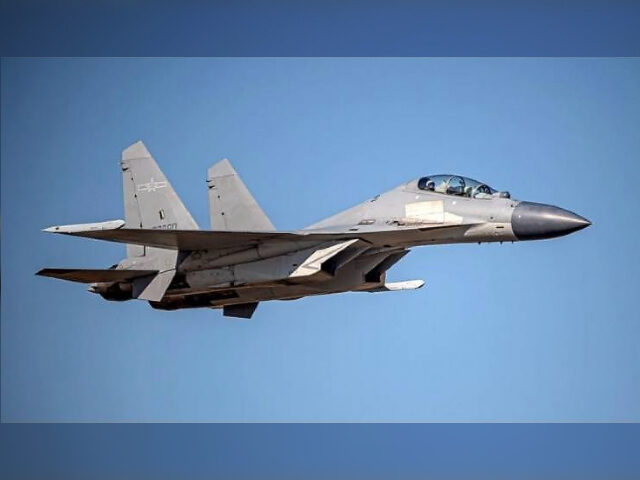China launched its largest incursion to date into Taiwan’s Air Defense Identification Zone (ADIZ) on Sunday. 71 Chinese military aircraft entered the ADIZ in a span of 24 hours, 43 of them also crossing the median line of the Taiwan Strait, the unofficial border between the mainland People’s Republic of China (PRC) and the island-based Republic of China (ROC).
The Taiwanese Defense Ministry said seven surface vessels from China’s People’s Liberation Army (PLA) were also detected near Taiwan.
Taiwan said the PLA aircraft included top-of-the-line fighters and bombers, anti-submarine, electronic warfare, and support planes. The PLA released photos to Chinese state media that suggested at least one H-6 nuclear-capable bomber and a Type 052C guided missile destroyer were involved in the exercise.
The ADIZ is a buffer zone of carefully-monitored airspace that surrounds a country’s secure national airspace. Penetrating Taiwan’s ADIZ, especially with so many military aircraft, is considered provocative but not an act of war.
Even more provocative is China crossing the median line of the Taiwan Strait, also known as the “Davis Line” after World War 2-era American Brig. Gen. Benjamin Davis. The median line is not an officially recognized border, but it has long been treated as a “do not cross” safety buffer by both China and Taiwan.
China has been penetrating Taiwan’s ADIZ and crossing the Davis Line with increasing frequency since 2020. Over 1,700 incursions were perpetrated by the PLA over the past year, an increase from 969 in 2021 and 146 in 2020.
The PLA claimed its “strike drills” and “combat patrols” on Sunday were a “firm response to the current U.S.-Taiwan escalation and provocation.” This was a reference to the latest U.S. defense spending bill, which included up to $10 billion in security assistance for Taiwan over the next five years and expedited arms sales to Taiwan.
President Joe Biden signed the bill into law on Friday. On Saturday, the Chinese Foreign Ministry declared it was “strongly dissatisfied and resolutely opposed” to the American defense spending bill, claiming it “ignores the facts to exaggerate a ‘China threat’, wantonly interferes in China’s internal affairs and attacks and smears the Chinese Communist party.”
The PLA stepped up its threatening activities around Taiwan throughout December as the U.S. defense bill made its way through Congress, including committing an ADIZ incursion with 18 nuclear-capable bombers on December 13.
Taiwanese President Tsai Ing-wen held a meeting with military officers on Monday morning. She reportedly did not directly address the massive Chinese ADIZ incursion directly, but she did call for increased defense capacity to resist “the continuous expansion of authoritarianism.”
“The more preparations we make, the less likely there will be rash attempts of aggression. The more united we are, the stronger and safer Taiwan would become,” Tsai said.
Tsai is expected to announce a decision on Tuesday afternoon concerning a proposal to extend mandatory military service from four months to a full year. Early indications are that Tsai will make the extension, which would take effect at the beginning of 2024.
One year is the longest conscription period Tsai’s administration can authorize without revising the military service law. The mandatory service period for men over 18 was as long as three years during the Cold War era, but was scaled back to one year in 2008, and then four months in 2013. Taiwan’s combat troops are now primarily volunteers, with most conscripts expected only to undergo a few weeks of boot camp and then perform support duties.

COMMENTS
Please let us know if you're having issues with commenting.